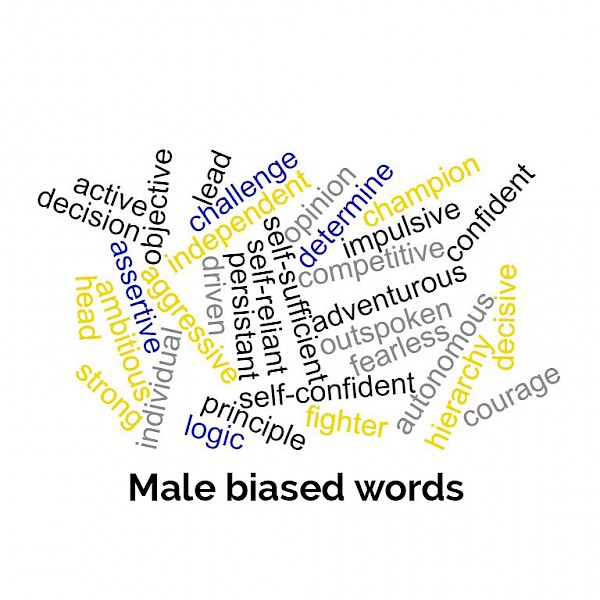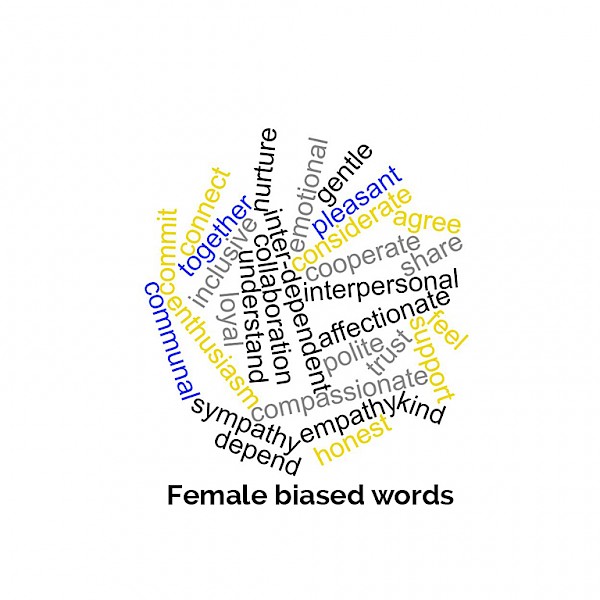Unconscious Bias in Job Descriptions



Practical Steps to Overcoming Unconscious Bias in Job Ads
Unconscious bias is the assumptions automatically linked to our judgements, social background, personal values, etc. Many job descriptions often contain an inadvertent gender bias because of the style and language that they are written in. This has the risk of putting people off applying for jobs which ultimately will affect the company’s competitive edge if they are unable to fill key positions.
Job vacancy ads that get more applicants will inevitably attract a wider pool of stronger candidates and ads that attract more women can have a huge impact on the business. Research suggests that women can have a decisive sway on the collective intelligence of groups; and, at a larger level, companies with a higher percent of female leadership are consistently shown to be more profitable.
So what can you do at a grass-roots level to drive gender diversity when hiring?


The phrasing of a job ad can have an enormous influence on the individuals that it appeals to. A great deal of language can have an exclusionary effect on a subconscious level. For example, focusing on traits such as being ‘aggressive’, ‘assertive’ or ‘independent’ rather than things like being ‘conscientious’, ‘dedicated’ and ‘sociable’ will typically put off women.
Terms that focus on competition over support and commitment seem to be far less attractive to female candidates (even where their relative use has no impact on the meaning of the sentence). As the title of the following paper suggests, there is (good) ‘Evidence That Gendered Wording in Job Advertisements Exists and Sustains Gender Inequality’ and this can make a decisive difference on the effectiveness of the ad.


Textio, an augmented writing platform, reports that using gender-neutral language means that hires can be made up to 14 days faster; and ZipRecruiter has found that cutting gender-biased terms can increase the number of applicants by 42%. Meanwhile, on a practical level, tools like the Gender Decoder for Jobs Ads can assess what might be subtly gendered language and help recruiters to eliminate it.
“When we write a job ad, we’re writing it in the image of ourselves,” notes Marie-Clare Fenech, Client and Project Lead, Next Tech Girls, and Director of My Recruitment Space. “That might be men looking for money hungry, competitive, determined individuals – all this sort of thing – because that’s how they see themselves. This is how that bias then enters the job ad description.”
And this terminology can transform the culture from the bottom up. Phrases such as ‘coding ninja’ send a message to women that these are hostile work environments for female staffers,” Aubrey Blanche, Atlassian's Global Head of Diversity & Belonging, observed to the BBC.


When describing a role, lists of desired skills and experience can be exhaustive – but this can be disproportionately off-putting for women.
On average, men generally look at a job spec and if they can meet the majority of bulleted items then they will apply for the role. Women, however, typically ensure that they can fulfill all or nearly all of the criteria before applying.
The key is to separate the list between must-haves and nice-to-haves. If something isn’t absolutely essential, then consider cutting it to avoid putting up unnecessary barriers to entry.


The default concept of a role is likely to be a full-time, office-based position. However, this rules out the vast majority of potential candidates – and women, with working mothers among them, are particularly likely to be adversely impacted by this inflexibility.
In reality, what the employer most likely wants isn’t just for time to be spent at the desk but for specific responsibilities to be handled and for specific tasks to be completed. It’s worth asking whether the role could be part-time or could work around a job share; and it’s worth questioning how much time, if any, actually needs to be spent in the office. A step further is to explore whether hours need to be specified at all for the desired goal to be reached (something which may be particularly possible with sales roles).
“A lot of firms reward on input,” notes Marie-Clare. “You come in at seven in the morning and leave at nine. You’re inputting, they can see you inputting and you get praised and/or rewarded based on that because they assume that from that input you’re going to get the results… It takes a lot of trust to re-engineer that kind of environment to be one that is about output rather than input.”


To find candidates who will be a good fit for the organisation, it’s worth being honest about your values and if you have a commitment to diversity, and programmes that support diverse employees, then say so. While it’s the icing on the cake, it makes the point clear.
After all, there’s a great deal to play for – and diversity can make a critical difference for the businesses of the future. “Studies have shown that having truly diverse teams not only contributes diverse thinking but actually makes people think differently,” notes Marie-Clare. “It increases the creativity of the individual within the team.”
And if a boost in creative intelligence isn’t a sufficiently compelling argument, then there’s the money. “Most companies are driven on revenues and profit and every single piece of research shows that a gender diverse team, especially at the top, leads to a greater percentage of profit, and a greater increase of profits and turnover,” says Marie-Clare. “The single most compelling argument [to actively pursuing gender diversity] is an increase in revenues –it’s not just a nice-to-have.”

Empiric is a multi-award winning business and one of the fastest growing technology and transformation recruitment agency's specialising in data, digital, cloud and security. We supply technology and change recruitment services to businesses looking for both contract and permanent professionals.

Read more (pdf download)
Empiric are committed to changing the gender and diversity imbalance within the technology sector. In addition to Next Tech Girls we proactively target skilled professionals from minority groups which in turn can help you meet your own diversity commitments. Our active investment within the tech community allows us to engage with specific talent pools and deliver a short list of relevant and diverse candidates.
For more information contact 02036757777 To view our latest job opportunities click here.